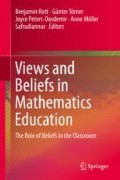Abstract
We developed a beliefs questionnaire named TBTP that allows us to investigate the possible influence of not only beliefs about mathematics but also beliefs about students’ math abilities on teachers’ actions in teaching mathematics and problem solving. The purpose of this study is to evaluate its reliability and validity. In this study, 43 teachers responded to the TBTP. The evaluation shows that the TBTP is reliable and valid since the analyses of the data confirm our hypotheses: teachers’ responses show that they differentiate their style of teaching because of their students’ math abilities and there is a correlation between teachers’ beliefs about mathematics and their responses about their practice of mathematics and problem-solving.
Access this chapter
Tax calculation will be finalised at checkout
Purchases are for personal use only
References
Anderson, J., White, P., & Sullivan, P. (2005). Using a schematic model to represent influences on, and relationships between, teachers’ problem-solving beliefs and practices. Mathematics Education Research Journal, 17(2), 9–38.
Bolarinwa, O. A. (2015). Principles and methods of validity and reliability testing of questionnaires used in social and health science researches. Nigerian Postgraduate Medical Journal, 22(4), 195–201.
Brown, A., & Maydeu-Olivares, A. (2012). How IRT can solve problems of ipsative data in forced-choice questionnaires. Psychological Methods, 18(1), 36–52.
Chen, Q., & Leung, F. K. S. (2013). A comparative study of teachers’ mathematics beliefs in the context of curriculum reform in Hong Kong and Chongqing. The Mathematics Educator, 15(1), 46–65.
Cooney, T. J. (1985). A beginning teacher’s view of problem solving. Journal for Research in Mathematics Education, 16(5), 324–336.
Di Martino, P., & Sabena, C. (2010). Teachers’ beliefs: The problem of inconsistency with practice. In M. Pinto & T. Kawasaki (Eds.), Proceedings of the 34th conference of the international group for the psychology of mathematics education (Vol. 2, pp. 313–320). Belo Horizonte, Brazil: PME.
Ernest, P. (1989a). The impact of beliefs on the teaching of mathematics. In P. Ernest (Ed.), Mathematics teaching: The state of the art (pp. 249–254). London: Falmer Press.
Ernest, P. (1989b). The knowledge, beliefs and attitudes of the mathematics teacher: A model. Journal of Education for Teaching, 15(1), 13–33.
Evan, R., & Kvatinsky, T. (2009). Approaches to teaching mathematics in lower-achieving classes. International Journal of Science and Mathematics Education, 7(5), 957–985.
Field, A. (2005). Discovering statistics using SPSS (3rd ed.). London: Sage Publication Ltd.
Hannula, M., & Oksanen, S. (2016). The effect of teacher beliefs on student affect and achievement. In Paper presented at the conference of the 13th international congress on mathematical education. Germany: Hamburg.
Kline, P. (1986). A handbook of test construction: Introduction to psychometric design. New York: Methune.
Liljedahl, P. (2008). Teachers’ insights into the relationship between beliefs and practice. In M. Jürgen & W. Schlögmann (Eds.), Beliefs and attitudes in mathematics education: New research results (pp. 33–44). Rotterdam: Sense Publishers.
McCarty, J. A., & Shrum, L. J. (1997). Measuring the importance of positive constructs: A test of alternative rating procedures. Marketing Letters, 8(2), 239–250.
Munson, J. M. (1984). Personal values: Considerations on their measurement and application to five areas of research inquiry. In R. E. Pitts Jr. & A. G. Woodside (Eds.), Personal values and consumer psychology (pp. 13–33). Lexington, MA: Lexington Books.
Pehkonen, E. (2017). Teaching mathematics via problem solving. In M. Stein (Ed.), A life’s time for mathematics education and problem solving (pp. 45–69). Munster: WTM.
Philipp, R. A. (2007). Mathematics teachers’ beliefs and affect. In F. K. Lester (Ed.), Second handbook of research on mathematics teaching and learning: A project of the national council of teachers of mathematics (pp. 257–315). Charlotte, NC: Information Age Publishing.
Raudenbush, S. W., Rowan, B., & Cheong, Y. F. (1993). Higher order instructional goals in secondary school: Class, teacher and school influences. American Educational Research Journal, 30(3), 523–553.
Raymond, A. M. (1997). Inconsistency between a beginning elementary school teacher's mathematics beliefs and teaching practice. Journal for Research in Mathematics Education, 28(5), 550–576.
Rott, B. (2011). Problem solving processes of fifth graders: An analysis of problem solving types. In B. Ubuz (Ed.), Proceedings of the 35th conference of the International Group for the Psychology of mathematics education, Vol. 4 (pp. 65–72). Ankara, Turkey.
Safrudiannur, & Rott, B. (2017). Teachers’ beliefs and how they correlate with teachers’ practices of problem solving. In B. Kaur, W. K. Ho, T. L. Toh, & B. H. Choy (Eds.), Proceedings of the 41st conference of the International Group for the Psychology of mathematics education (Vol. 4, pp. 121–128). Singapore: PME.
Shepard, L. (1993). Evaluating test validity. Review of Research in Education, 19, 405–450. Retrieved from http://www.jstor.org/stable/1167347
Stipek, D. J., Givvin, K. B., Salmon, J. M., & MacGyvers, V. L. (2001). Teachers’ beliefs and practices related to mathematics instruction. Teaching and Teacher Education, 17(2), 213–226.
Törner, G., & Pehkonen, E. (1998). Teachers’ beliefs on mathematics teaching–comparing different self-estimation methods–a case study. Retrieved from https://duepublico.uni-duisburg-essen.de/servlets/DerivateServlet/Derivate-5246/mathe91999.pdf
Van de Walle, J. A., Bay-Williams, J. M., Lovin, L. H., and Karp, K. S. (2013). Teaching student-centered mathematics: Developmentally appropriate instruction for Grades 6-8 (Vol. III, 2nd edn). Pearson Education.
Yurdugül, H. (2008). Minimum sample size for Cronbach’s coefficient alpha: A Monte-Carlo study. Hacettepe Üniversitesi Eğitim Fakültesi Dergisi, 35, 397–405.
Zakaria, E., & Musiran, N. (2010). Beliefs about the nature of mathematics, mathematics teaching and learning among trainee teachers. The Social Sciences, 5(4), 346–351.
Zohar, A., Degani, A., & Vaaknin, E. (2001). Teachers’ beliefs about low-achieving students and higher order thinking. Teaching and Teacher Education, 17(4), 469–485.
Author information
Authors and Affiliations
Editor information
Editors and Affiliations
Appendix
Appendix
Rights and permissions
Copyright information
© 2018 Springer Nature Switzerland AG
About this chapter
Cite this chapter
Safrudiannur, Rott, B. (2018). Evaluation of a Questionnaire for Studying Teachers’ Beliefs on Their Practice (TBTP). In: Rott, B., Törner, G., Peters-Dasdemir, J., Möller, A., Safrudiannur (eds) Views and Beliefs in Mathematics Education. Springer, Cham. https://doi.org/10.1007/978-3-030-01273-1_19
Download citation
DOI: https://doi.org/10.1007/978-3-030-01273-1_19
Published:
Publisher Name: Springer, Cham
Print ISBN: 978-3-030-01272-4
Online ISBN: 978-3-030-01273-1
eBook Packages: EducationEducation (R0)

